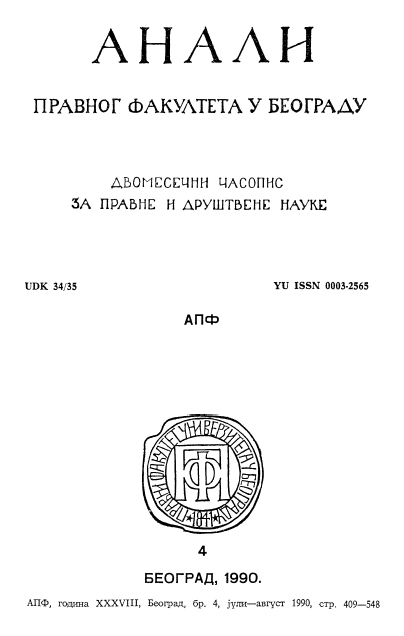ПОЛОЖАЈ ДУЖНИКА КОЈИ JE ИЗВРШЕЊЕ УГОВОРНЕ ОБАВЕЗЕ ПОВЕРИО ТРЕЋЕМ ЛИЦУ
THE POSITION OF A DEBTOR ENGAGING A THIRD PERSON FOR DISCHARGING THE CONTRACTED OBLIGATION
Author(s): Ivica JankovecSubject(s): Law on Economics
Published by: Правни факултет Универзитета у Београду
Keywords: By-contract; Debtor's deputy; Contractual liability
Summary/Abstract: In some cases a debtor may engage a third person to discharge his contractual obligation, acting as his assistant or deputy. Different cases are analyzed there of, including the basic case of effecting this by separate contract (by-contract) and by the rules of tort liability covering the compensation of damage caused by third person, or by eom- ployees. A debtor engaging an assistant is liable in the way he would be liable himself when discharging his contractual obligations. Namely, one can not permit that a debtor by his unilateral acts imperils the execution of assumed obligations, weaknening thus also the contractual discipline. There are cases of debtor being liable only for his choice of assistant or for instructions given. Some of the cases are prescribed by law, while in others the creditor gives his consent for engaging the assistant. Separate is the case of a debtor under a duty to choose his assistant with special care. Unless otherwise provided by law, the creditor has no direct rights, toward the debtor's assistant. However, if damage ensued due to assistant’s acts, the latter would be liable according to tort liability rules, so that a direct relationship is established between the creditor and such assistant. The situation is the same if the contract between the debtor and his assistant is stipulated in favour of the creditor. Creditor and debtor may exclude the liability of the debtor by contract for the work of the assistant discharging debtor’s obligation. If such clause means limitation or exemption of debtor's liability because of assistant’s negligence, it may be also used by the debtor if he entrusted the discharge of his obligation to the third person. However, due to relative effect of the contract, such restrictions do not produce legal effect regarding the creditor.
Journal: Анали Правног факултета у Београду
- Issue Year: 38/1990
- Issue No: 4
- Page Range: 443-460
- Page Count: 18
- Language: Serbian

